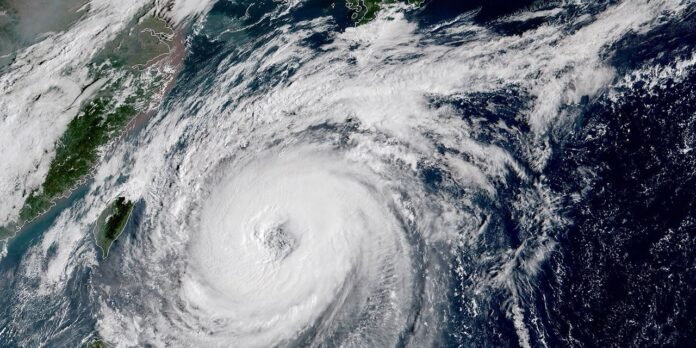The prevalence of extreme weather events is forcing the insurance sector to revise its models and increase its prices. But also to focus on a reinsurance market that appears more strategic than ever, as evidenced by the recent mergers between Berkshire Hathaway Inc and Alleghany, or between Covéa and PartnerRe.
The picture made the rounds on TV and social networks: on October 23, a storm similar to an American “mini-tornado” hit several localities in northern France, causing spectacular damage to several buildings. As a consequence of this meteorological event, which is as violent as it is inconsistent at this time of the year and in this part of French territory, almost 4,000 cases should be filed for property and loss compensation (fires, accidents and various risks) . people affected by the disaster, for a provisional amount estimated at 65 million euros. A further illustration of the consequences of climate change, which will lead to an increase in extreme phenomena, which in itself will put increasing financial pressure on insurance companies.
Because all signals are red. ” Although it is not uncommon for tornadoes to affect these regions (in northern France), such events of this intensity remain rare for the season. This is clearly an effect of climate change “Says Gilles André, CEO of RiskWeatherTech, a company specializing in climate modeling, which works with several big French names in insurance: Covéa, Axa, Abeille Assurances, etc. Insurers who see their models deeply affected by climate change – for not to mention the war in Ukraine or inflation, France Assureurs thus estimates the total damages caused in France at the end of the first eight months of the year at 5.2 billion euros, to which must be added the 2.4 billion in damages caused by the summer drought on buildings Translation: the sector expects, after an unfortunately historic 2022 financial year, a general increase in prices.
A global consolidation movement
Will that be enough? Probably not, as storms, floods and other landslides are expected to become the norm in the coming years: a report published in March 2022 thus expects a 130% increase in damage from floods in France violent and 110% for those related flood. And the giant Swiss Re estimated at the beginning of the year that the global economic losses due to natural disasters for the year 2021 alone amounted to 270 billion dollars – equivalent to 0.3% of GDP globally.
How can we continue to insure property and people in a world exposed to increasingly frequent and violent natural disasters? The solution must be found in a sector that is crucial for the solidity and sustainability of the insurance world: reinsurance companies, the players whose activity consists in supporting insurance companies when the latter has an acute, unforeseen or particularly high cash balance. A market that already weighs 270 billion dollars and is growing at an average of 3.3% per year.
The world of insurance-reinsurance, already severely challenged by the consequences of the Covid-19 pandemic, this time – relatively – had time to see it coming and is in the process of reorganizing itself to absorb the inevitable future shocks resulting from climate change. On a global level, a broad movement of consolidation can thus be observed. Larger insurance and reinsurance players will theoretically be stronger to absorb future catastrophes. Berkshire Hathaway Inc, the investment conglomerate of the famous financier Warren Buffett, recently got its hands on the American reinsurer Alleghany – a $12 billion operation. And French actors are not left out. More recently, it was leading mutualist Covéa that absorbed Bermudian reinsurer PartnerRe for €7.7 billion.
In particular, these operations, like Covéas, represent a way for insurance companies to benefit from the good knowledge that reinsurers have about the risks associated with climate change and, in the event of a major disaster, to guarantee themselves a kind of “safety net”. Finally, behind these mergers and acquisitions are important issues of sovereignty and strategic positioning, where each world power has an interest, in a context of uncertainty, in being able to count on national insurance-reinsurance champions capable of supporting its economy and its citizens in the face of the consequences of climate change.
